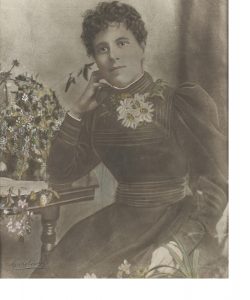Nurse Grace Jennings Carmichael
 Grace Elizabeth Jennings Carmichael was born February 1867, in Ballarat, Victoria, to Archibald Carmichael and Margaret Jennings. Grace’s father died when she was three and her mother remarried Charles Naylor Henderson, who managed a station in the Gippsland region. The family moved to Gippsland and during her time living there Grace developed a passion for the Australian bush landscape, an appreciation she expressed through poetry and prose. Local newspapers published some of her early poetry, under the pen-name Jennings Carmichael.
Grace Elizabeth Jennings Carmichael was born February 1867, in Ballarat, Victoria, to Archibald Carmichael and Margaret Jennings. Grace’s father died when she was three and her mother remarried Charles Naylor Henderson, who managed a station in the Gippsland region. The family moved to Gippsland and during her time living there Grace developed a passion for the Australian bush landscape, an appreciation she expressed through poetry and prose. Local newspapers published some of her early poetry, under the pen-name Jennings Carmichael.At age eighteen Carmichael left home and in 1888 began training as a nurse at The Children’s Hospital, in Carlton, Melbourne. Carmichael was one of the first four successful candidates for the training program inaugurated in early 1890. Unfortunately her time at the hospital coincided with a typhoid epidemic and Carmichael was unable to escape contracting the disease – she left the hospital, close to death, and eventually returned to complete her training after her health recovered.
Carmichael continued to write poetry and prose during her time working at the hospital. Published in 1891, her most well-known work, Hospital Children, is a personal and evocative account of the lives of hospital patients and staff. She continued to write poetry, including a piece written on the behalf of the hospital – a plea to parents with healthy children to think of those in need:
‘Stretch your loving, open arms a little wider,
To your heart the world of little children take,
In remembering those you love may yet be calling
For the aid, you give today for someone’s sake!’
After graduating with her nurses’ certificate Carmichael left the hospital to work as a private nurse in Geelong, where she cared for a little boy with wooden legs. In 1895 Carmichael married Francis Henry Mullis, an English architect. They moved to Adelaide, where Carmichael gave birth to their first child. They then emigrated to London.
Life in London’s East End was not easy for the family – four more children were born, and when Mullis disappeared they fell into poverty. Carmichael’s living conditions and health deteriorated thereafter. She died of pneumonia in 1904, leaving behind five children, two of whom died soon after. Her three surviving sons were living in a workhouse in Northhampton in 1910, when admirers of Carmichael from her home country raised funds to have the children relocated to Australia and placed in private homes. Her eldest son was cared for by the family of the little boy Carmichael had once nursed in Geelong.
A number of memorial sites pay tribute to Carmichael, in remembrance of her contribution to Australian literature and to the wellbeing of children.
Image courtesy of the State Library of Victoria.
